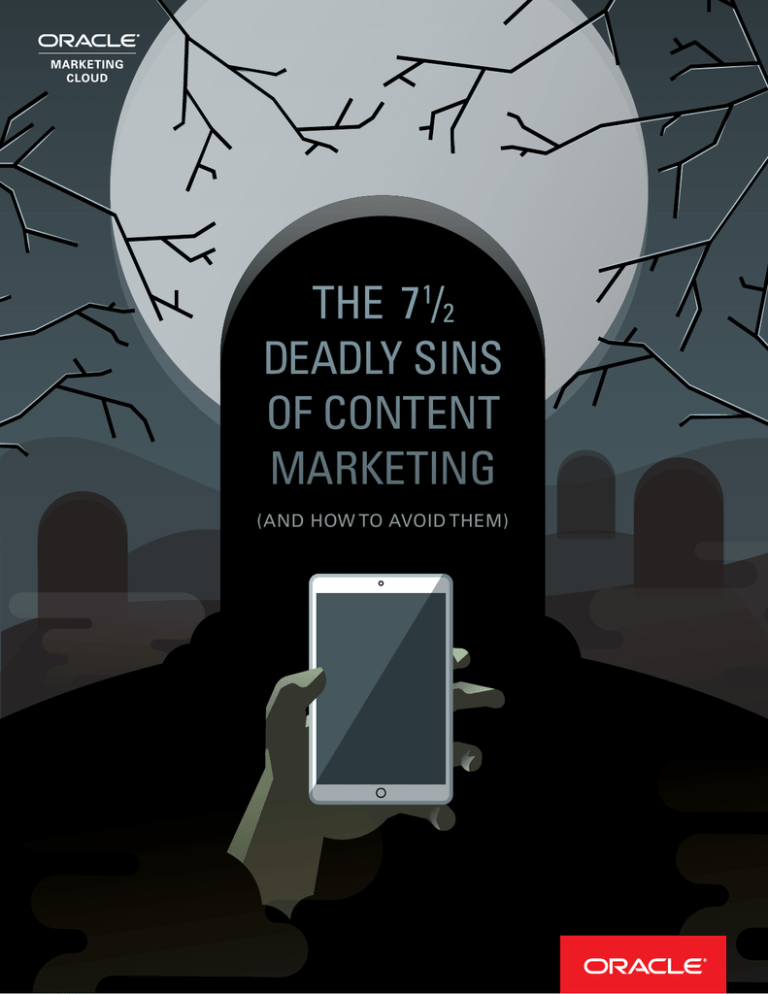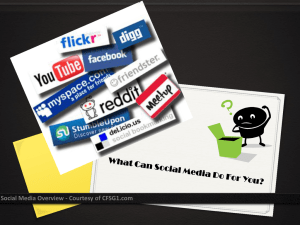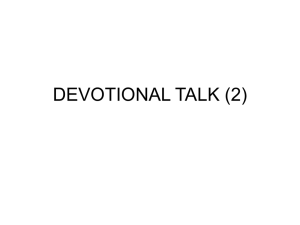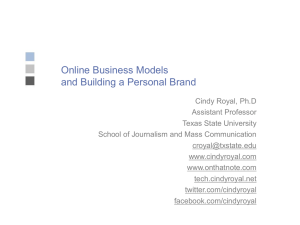
THE 71/2
DEADLY SINS
OF CONTENT
MARKETING
(AND HOW TO AVOID THEM)
TABLE OF CONTENTS
INTRODUCTION . . . . . . . . . . . . . . . . . . . . . . . . . . . . . . . . . . . . . . . . . . . . . . . . . . . . 3
THE 7½ DEADLY SINS OF CONTENT MARKETING (AND HOW TO AVOID THEM)
One: Making It All About You . . . . . . . . . . . . . . . . . . . . . . . . . . . . . . . . . . 5
Two: Not Adhering To The N.A.S. Doctrine. . . . . . . . . . . . . . . . . . . . . . . . 7
Three: Wrong Church, Wrong Pew. . . . . . . . . . . . . . . . . . . . . . . . . . . . . . 9
Four: Forgetting The 3Rs Of Content Marketing. . . . . . . . . . . . . . . . . . . 11
Five: Failing To Plan. . . . . . . . . . . . . . . . . . . . . . . . . . . . . . . . . . . . . . . . . 14
Six: On The Wrong Track. . . . . . . . . . . . . . . . . . . . . . . . . . . . . . . . . . . . . 16
Seven: You Set It And Forget It. . . . . . . . . . . . . . . . . . . . . . . . . . . . . . . . 18
Seven 1/2: You’re Not Fully Committed. . . . . . . . . . . . . . . . . . . . . . . . . . 20
CONCLUSION . . . . . . . . . . . . . . . . . . . . . . . . . . . . . . . . . . . . . . . . . . . . . . . . . . . . . 22
2
THE 7½ DEADLY SINS OF CONTENT MARKETING
INTRODUCTION
You may not be aware of this but there is a dark side to content
marketing. It’s a place where the content zombies work and play and
where many—if not all—of the deadly sins outlined in this book are
committed on a regular basis.
And speaking of deadly sins…
Remember the movie 7? Or is it Seven? Actually it's Se7en. The film is about a serial killer who’s
decided to use the seven deadly sins as his modus operandi.
Well fortunately for you marketers out there committing the 7½ Deadly Sins of Content
Marketing presented here will not result in life-threatening peril. (However, that is not to say
peril is non-existent should you continue to commit some or all of The 7½ Deadly Sins of
Content Marketing.)
On the contrary for there is a serious and immediate danger inherent in each and every one of
these deadly sins.
At or near the top of the list of potential perils is loss of market share. Survey after survey and
study after study show that content marketing works and has a direct impact on the bottom line.
FOR EXAMPLE:
70% of consumers say content marketing
makes them feel closer to the sponsoring
company. (Source: Content Marketing Institute)
3
THE 7½ DEADLY SINS OF CONTENT MARKETING
60% of consumers are more likely to be
on the lookout for products when looking at
content marketing. (Source: The CMA)
Another clear and present peril is apathy among your once-loyal customers.
Today’s consumer wants not just content but also custom and relevant content that speaks to
them. They are your customers, are they not? You should know them fairly well, yes? So you
should in turn be able to deliver relatable content to them that resonates as opposed to the next
person who wants different content.
This is not to say you will suddenly be called upon to create a unique content marketing
campaign for each and every individual in your entire database.
Of course not.
But, this does mean you should be able to refine and define your customers and target and
segment them accordingly and in turn deliver to each group or segment the kind of custom
content they seek.
90% of consumers find custom content
useful. (Source: TMG Custom Media)
Dynamic content improves conversions by
50%. (Source: Oracle Marketing Cloud)
Last but surely not least is the effect content marketing has on the much desired “R” word
—relationship. We live in the Relationship Era where consumers want a given brand to have a
relationship with them rather than simply sharing transactions.
Make no mistake about it: using content marketing to create, foster, and maintain a relationship
with your customers and prospects is paramount to overall success.
78% of consumers believe that organizations behind the
content are interested in building good relationships.
(Source: TMG Custom Media)
Ok, the bad news first. Neither Brad Pitt nor Morgan Freeman will be able to save you should
you choose to commit any or all of The 7½ Deadly Sins of Content Marketing.
The good news is on the following pages you’ll find the redemptive ways and means to avoid
them yourself without the aid of any movie stars.
4
THE 7½ DEADLY SINS OF CONTENT MARKETING
ONE
MAKING IT ALL ABOUT YOU
5
THE 7½ DEADLY SINS OF CONTENT MARKETING
YOUR CUSTOMERS AND PROSPECTS DON’T
REALLY CARE ABOUT YOU. THEY CARE ABOUT
WHAT YOU CAN DO FOR THEM
T
here’s nothing wrong with having an ego. Many
successful people have massive egos and like
nothing better than talking about themselves.
There’s nothing wrong with being proud of your brand;
for thinking yours is the greatest brand in the history of
brands. But guess what, every other brand thinks the
same way. Your competition thinks the same way.
It’s always been that way and always will be.
THE QUESTIONS YOU NEED TO ASK YOURSELF ARE
However, just because there are people who enjoy
talking about themselves and blowing smoke up their
own chimney—well, you get the idea—does not mean
your company, brand, or business should follow suit
when it comes to content marketing.
For example, blogging is a classic content marketing
staple. But a blog is not the place to tell someone about
your product or service that’s running a half-price special
for people whose last name ends in a vowel every
Wednesday in August.
Someone once said, “It’s called a blog, not a brag.”
What a great line. It speaks directly to the point. You
can’t make your content marketing efforts all about you
and your company or brand. Far too many marketers
look at content marketing through their eyes and not the
consumer’s. Big mistake.
What makes you different than the next guy?
Why are you better than them?
Then take that knowledge and tell the consumer how
all that great knowledge you have is going to help them
in their lives. Help them solve their problems, ease their
pain points, or make them more popular in 12 ways. That
will in turn build trust and you will have a loyal customer
for sure.
The right way to do content marketing is by informing
the consumer why this product is right for them and
how it will help them. Show them by telling them a story
featuring someone using the product. Explain why they
like the product—not why you like it.
Consumers know you like your own product because
they know it’s your job to sell it.
Marketers should not be asking themselves “What’s
in for me?” when it comes to content marketing. They
should be asking “What’s in it for them?” as in what’s
in it for the consumer, buyer, or prospect.
Now, this is not to say marketers should not include
branding as part of their content marketing activities.
They absolutely should.
LESSON
When it comes to content marketing,
make it about THEM—not YOU.
6
THE 7½ DEADLY SINS OF CONTENT MARKETING
T WO
NOT ADHERING TO
THE N.A.S. DOCTRINE
7
THE 7½ DEADLY SINS OF CONTENT MARKETING
YOU DON’T NEED TO SELL SOMETHING
EVERY SINGLE TIME YOU GENERATE CONTENT
O
kay quick, other than the Monroe Doctrine—
which we learned about in grade school—how
many doctrines can you name?
Consumers today want more; they want a brand to tell
them a story.
Probably not many. That’s ok, not many of us can.
And while the N.A.S. Doctrine may never find its way
into the textbooks in schools, it should be required
reading for all brands operating in today’s ubercompetitive, content-driven world we live in.
The concept of Not Always Selling—that is the N.A.S.
Doctrine. The idea and belief that a given brand does
not need to always try and sell something via every
communication touch point they have with a consumer.
This of course is a tremendously difficult idea and belief
for many a brand to accept, much less implement.
But if you think about it in sheer numbers, it makes
perfect sense. Let’s say you use some or all of the
following mediums to connect, engage, and relate to
your audience:
• Email
• Blogging
• TV
• Display
• Mobile/SMS
• Radio
• Social
• Mobile
• Direct
Media
Display
“Advertisements should tell a unique story,
not just try to sell.”
—FORBES
And every brand—big and small—has stories to tell. Be
it a personal story, brand story, or product story—every
single brand and business has stories to tell.
Mail
Across some or all of these channels lie a very high
number of opportunities—or touch points—to engage
with and relate with your audience. Do you really think
it’s a good idea to try and sell your audience something
at each and every one of these touch points?
Of course not.
LESSON
There is no law that states you must try and
sell something to someone every single time
you communicate with or advertise to them.
8
THE 7½ DEADLY SINS OF CONTENT MARKETING
THREE
WRONG CHURCH, WRONG PEW
9
THE 7½ DEADLY SINS OF CONTENT MARKETING
NOT KNOWING YOUR AUDIENCE
t would seem fairly obvious that brands and
businesses would know their customers, right?
Especially in today’s technologically-advanced
world where the ability to capture even the most
of basic of data is readily available, one would think
most companies would be able to know something
about their customers.
So, before you dive head first into content marketing,
you must first know your audience to then in turn begin
to create the content that’s relevant to them. Start by
taking your existing database of customers and either
work with your internal team or an outside vendor to
help create segmentation, even if it is only by age
and gender.
Something meaning—at the very least—the ability to
create simple segmentation based on things like gender,
geographic location, and so on.
Then you can begin to create content directed at each
segment and watch; analyze constantly to see how
each segment is responding to the content you are
providing. We’ll dig deeper into this a little later in
“On The Wrong Track.”
I
Of course those of us in the real world know that far too
many brands and businesses simply do not know who
their customers are and therefore cannot target them in
the first place with their content marketing strategies.
How can you target someone when you don’t know
who you’re targeting?
Even if you only sell one product or service there is
still reason to segment your audience. The men in your
audience may have different buying patterns from the
women, for example.
Those under age 30—as another example—may prefer
to be communicated with via social media while a whole
other group may prefer email as a means to market
to them.
LESSON
"You must deliver relevant content to the right
person at the right time on the most appropriate
channel.”
—Chris Moody, Director of Content Marketing, Oracle Marketing Cloud
10
THE 7½ DEADLY SINS OF CONTENT MARKETING
FOUR
FORGETTING THE 3Rs
OF CONTENT MARKETING
11
THE 7½ DEADLY SINS OF CONTENT MARKETING
FAR TOO MANY BRANDS BIG
AND SMALL FORGET TO REPURPOSE,
REUSE, AND RECYCLE CONTENT
S
o you’re all grown up and think you don’t need
to know anything more about the 3 Rs, right?
You’ve got Reading, wRiting, and, aRithmetic
down pat.
Well, here are 3 more Rs for you to learn, remember,
and put into practical application when it comes to your
content marketing strategy:
• Repurpose
• Reuse
AND HERE ARE SOME IDEAS ON WHERE TO
REPURPOSE, REUSE, AND RECYCLE YOUR CONTENT:
Email. Email newsletters are a great way
to repurpose your content. You can share a
shortened version of your blog posts while
including a link to back to the full article on
your blog. • Recycle
They all pretty much mean the same thing, but the basic
premise is that the content you create can more than
likely be repurposed, reused, and recycled and there are
benefits to doing so.
Huge benefits.
But before we get to the benefits, here are some
examples of the type of content that can be repurposed,
reused, and recycled:
Social Media Posts. When you publish
a blog post, repurpose it into short-form
content on your social media platforms.
Pinterest. If your blog post or eBook
has images, infographics, or charts, use
Pinterest. Just remember to embed the link
back to the original content to drive users
to it.
Video. Creating videos has never been
easier. So turn a blog post, or excerpt from
a presentation or webinar into a video.
• Blog
Posts
• Infographics
• Press Releases
• Case Studies
12
• Reports
• eBooks
• White
• Webinars
Papers
• Presentations
• Forums
THE 7½ DEADLY SINS OF CONTENT MARKETING
AND WITHOUT FURTHER ADO, HERE ARE
THE BENEFITS OF THE 3RS:
No more losing sleep over creating freshly baked
content. It can be very difficult and stressful finding new
topics to discuss/write about, etc. But by taking existing
content, say a white paper, and turning that into a blog
post of “fresh” content will go a long way in relieving
that stress and insomnia.
A better SEO experience. Search engines put a lot of
weight on fresh, new, and engaging content. When you
put your content on different platforms using the same
keywords, your customers and prospects are searching
for, you increase the chance of reaching a wider
audience and in turn having more people curate or share
your content with others.
More appeal and exposure. The competitive landscape
for any business is congested. By using the 3Rs, you
help get your business or brand noticed in that ultracrowded landscape. It also provides consumers with
a variety of options to consume your content. What
someone may want to consume via a blog post,
someone else may prefer to do so through a video.
.
LESSON
Apply the 3Rs to as much of your content as
you can, but keep in mind one of the 3Rs is not
republish. Never repurpose, recycle, or reuse
the exact same content in the same form it was
originally created in.
13
THE 7½ DEADLY SINS OF CONTENT MARKETING
FIVE
FAILING TO PLAN
DEAD
END
14
THE 7½ DEADLY SINS OF CONTENT MARKETING
THOSE WHO FAIL TO PL AN…
YOU KNOW THE REST
Y
ou do know the rest of course, which is “those
who fail to plan… plan to fail.” And that is
very much the case when it comes to content
marketing and content strategy.
WHO WILL CREATE AND CURATE YOUR CONTENT?
• Internal
staff
vendor(s)
• External
• Both
You very well could have the greatest content on the
planet which you share across every medium and
platform where your audience resides and so on and
so forth. But without a solid strategy and plan in place,
it simply will not matter.
Rachel Metscher, Director of Content Marketing at ICF
International says planning plays a huge role in their
content marketing strategy.
“What we plan to create that is approved by all involved,
when it is to be delivered, how we plan to use it and
repurpose, and what channels will it be distributed,”
she says. “Success metrics are defined by the team
and reported on a monthly basis.”
First and foremost, you need to ask yourself some
basic questions when it comes to planning and content
marketing.
Who is your audience? Who are you creating the content
for? See the previous section Wrong Church and Wrong
Pew (Not knowing your audience) for more on why it is
so important to know your audience.
WHAT DO YOU HOPE TO ACHIEVE WITH YOUR
CONTENT MARKETING STRATEGY?
• Increased
engagement
• Sales/Revenue
15
• Leads
• All
of the above
THE 7½ DEADLY SINS OF CONTENT MARKETING
What are the keywords your customers and prospects
are searching on? As mentioned earlier in Forgetting
the 3Rs of Content Marketing, using the keywords that
people are searching on when it comes to your business
is vital. The key is to know what those keywords are in
the first place!
There are more questions to be answered for sure, but
these are the basics.
From here, you then need to think about planning your
content for at a minimum six months in advance via an
editorial calendar. This will help immensely as you plan
your content around differing events such as product
launches, webinars, white papers, etc.
An editorial calendar is a staple when it comes to
planning your content strategy. Not only will it help with
planning content around events, it will help organize and
map out your plan when it comes to the “day-to-day”
content such as blog posts, articles, etc.
And what good is planning without having the ability to
track and measure your content marketing strategy?
Great question, glad you asked.
SIX
ON THE WRONG TRACK
16
THE 7½ DEADLY SINS OF CONTENT MARKETING
NO TRACKING OR
MEASUREMENT PROTOCOLS
o you know your content marketing goals,
what you want to achieve. Let’s say you want
to increase engagement with your customers
and prospects. You notice that your blog posts,
social media posts and so on are not being shared, liked,
commented on, retweeted, repinned, etc.
S
Well, the only way to tell for sure if you’re indeed
increasing engagement is to track and measure
accordingly AND then adjust accordingly.
For example, you create a series of blog posts on a
varying number of topics—all within the scope of your
business of course—meaning that if you make umbrellas
don’t write a blog post about macaroni and cheese.
You will want to track how people are engaging, or not
for that matter, with each of the blog posts. Perhaps
one or two received a lot of comments and/or was
shared via social media networks—more so than the
other blog posts.
Of course, most businesses want to track and measure
their content marketing (and all marketing for that matter)
based on how many leads and sales it generated. Here
are some ways:
Leads. You can track how many people
submitted a form right after reading or
consuming your content. Another option is
to set a browser cookie on the landing page
and then track when someone completes
the form subsequent to consuming content.
Sales. Going on the assumption you have
a customer or prospect database, you can
track and record every time someone in
your database consumes some of your
content. Looking at the behavior of contacts
in accounts that have recently closed will
also provide some insight on the impact of
your content.
You may want to then try generating more blog posts
on the same topics that drew the most interest/
engagement and see if this is the type of content your
readers are interested in.
But you won’t be able to do all this if you are not tracking
and measuring everything in the first place.
LESSON
You track every other marketing campaign. So
why would content marketing be any different?
Establish your goals then track and measure
your content marketing efforts to ensure you’re
meeting or exceeding those goals.
17
THE 7½ DEADLY SINS OF CONTENT MARKETING
SEVEN
YOU SET IT AND FORGET IT
18
THE 7½ DEADLY SINS OF CONTENT MARKETING
NO DISTRIBUTION PL AN
OR SHARING OF CONTENT
T
ime for another movie reference. This time it’s
Field of Dreams. One of the most enduring and
iconic lines from the film is: “If you build it, they
will come.”
And while that worked in Iowa, it’s not going to work for
you when it comes to content marketing, be it in an Iowa
cornfield or any other place on Earth. Even if you create
the greatest content since the invention of content itself,
it won’t mean a thing if no one knows about it.
And the only way people will know about it is if you tell
them about it across multiple channels.
Case in point: You create a killer blog post, you Tweet
out the title and link to your Twitter followers, but you
don’t share it on Facebook. Or vice-versa, you share it
on Facebook but not on Twitter.
Or you create a killer video on your brand, your product,
or a new launch and post it to YouTube and then… do
nothing. You don’t post it on Facebook, you don’t share
it on Twitter, and you don’t add it to your website. It just
sits there all alone on YouTube.
Oh sure everyone inside your company loves it but at
the end of the day who cares? What is that video doing,
that cool, slick video doing for you, your business, and
your bottom line?
Remember, this is not Iowa. Even if you happen to work
in Iowa, it’s not still Iowa—in a matter of speaking. And
chances are it’s not a cornfield.
You want to know the best part? You may very well have
employees—AKA your internal brand ambassadors—
who are active in social media yet never share, Tweet,
Like, Repin, or do anything else with your branded
content for their audience.
And why? Well they may not know about your content in
the first place. Or they’ve never been asked or requested
to do so in the second place!
You need to have a plan in place whereby you / your
company / your employees share and re-share your
content.
The reason the word re-share is bolded and underlined
is to drive home a point which is you have to share your
content more than once. Don’t just Tweet or Facebook
it once and think to yourself: “Ok, that’s done, let’s
move on.”
Think of Twitter, Facebook, and all social media
networks like your email inbox. Your inbox is constantly
being populated, which in turn pushes emails down
further and further, which in turn takes them out of your
line of sight.
You never know when someone will see your Tweet,
your Facebook post, and so on as their inbox is
constantly being populated pushing your content down
out of their sight. So repost and re-share. Just don’t go
overboard and think you need to do it every hour on the
hour or something like that. Use common sense.
LESSON
Even with the greatest content ever created, it
will not mean a thing if you do not share it with
the world. Just because you build it does not
mean they will come. You must first tell them
all about it and then they may come.
19
THE 7½ DEADLY SINS OF CONTENT MARKETING
SEVEN ½
YOU'RE NOT FULLY COMMITTED
YOU’RE ONLY
HALF WAY IN WHEN
IT COMES TO
CONTENT MARKETING
20
O
kay this should in fact be a full blown deadly sin
of content marketing but you have to admit the
play on words is quite funny, yes?
The play on words aside, it’s abundantly clear that when
it comes to content marketing there is no halfway,
there is no middle ground. You are either in or you are
out. Period.
You cannot post to a blog or send out a Tweet or share
something on Facebook on one day for example then
not do anything for two weeks—and then wonder aloud
why your content marketing is not working.
Remember your first day in marketing class? One of the
first things you learned was The Rule of Seven. It may
have been referred to by another name, but regardless
the rule essentially states that a prospect needs to see
THE 7½ DEADLY SINS OF CONTENT MARKETING
or hear your marketing message at least seven times
before they take action and buy from you.
What that means is if you have a blog, post to it on a
regular basis.
It is the same principle when it comes to content
marketing.
If your company uses Twitter, Facebook, Google Plus,
Pinterest, or any other social media network, use it on
a regular basis. How often do you look at someone
else’s Twitter profile or a brand’s Twitter profile and see
they haven’t Tweeted in months? That’s a good reason
to immediately move on and disregard them. Happens
all the time.
Just like you would not send one or two marketing
messages to a consumer expecting them to then buy,
nor should you only produce and share content on a
minimal basis and expect to see results.
The key word here is consistency. You have to be
consistent in producing quality and relevant content to
your audience across all platforms you’ve chosen to be
active on.
Nothing is worse than seeing a brand that came out
firing on content marketing—posting, sharing, etc. on a
regular basis—then suddenly crash to a screeching halt.
LESSON
When it comes to content marketing you are
either 100% in or you are 100% out. You are
either on the bus or off the bus. Do not start
unless you plan on seeing it through until the
end of all time, or something like that.
21
THE 7½ DEADLY SINS OF CONTENT MARKETING
CONCLUSION
Truth be told, there could have easily been ten or twelve deadly sins
when it comes to content marketing. We focused on what we believe to
be the deadliest. But just in case you were morbidly curious, here’s some
that didn’t make the cut but are still important just the same:
No Call To Action. Every piece of content you create needs to have a call to action (CTA). For
example, let’s say you write a blog post based on a white paper you wrote. At the end of the
blog post, include a CTA to download the full white paper.
Lack of Personality. The content you create will theoretically be consumed by human beings. As
such, humans like to read things that are written the way they speak. Save the technical, roboticlike verbiage and tone for an internal document.
Straying From the Brand. One caveat to the previous item is that it’s important to always stay
on brand. That means if your brand voice is not exactly conversational, don’t all of a sudden start
throwing out “Hey listen up, dude!” in your blog post.
The bottom line is there is no magic elixir for content marketing. There is no one-size-fits-all.
Your brand is unique and so are your customers. In the 7½ Deadly Sins of Content Marketing,
they are laid out straightforward and require some good old fashioned common sense to avoid.
When done properly and with consistency, thought, and understanding, content marketing can
help businesses of all types by enhancing their brand image and overall marketing efforts.
22
THE 7½ DEADLY SINS OF CONTENT MARKETING
ABOUT ORACLE
MARKETING CLOUD
Modern Marketers choose Oracle Marketing Cloud solutions
to create ideal customers and increase revenue. Integrated
information from cross-channel, content, and social marketing
with data management and activation along with hundreds of
app and data partners enables them to target, engage, convert,
analyze, and use award-winning marketing technology and
expertise to deliver personalized customer experiences at
every interaction.
Visit oracle.com/marketingcloud
OLD SCHOOL
MARKETING
23 THE 7½©DEADLY
Copyright
2014, Oracle
SINS OF and/or
CONTENT
itsMARKETING
affiliates. All rights reserved.








